#Thou art thyself
Explore tagged Tumblr posts
Text
Me: Look around. Why is this allowed??? Liberals: We don’t have to fundamentally change the system we can regulate our way out of this. Me: Little girl gone, got a gun from gangsta. Run, little girl, run little girl. Bang. Ha.
#original post#O Romeo#Romeo#wherefore art thou Romeo?#Deny thy father and refuse thy name.#Or if thou wilt not#be but sworn my love#And I’ll no longer be a Capulet.#‘Tis but thy name that is my enemy:#Thou art thyself#though not a Montague.#What’s Montague? It is nor hand nor foot#Nor arm nor face nor any other part#Belonging to a man. O be some other name.#What’s in a name? That which we call a rose#By any other name would smell as sweet;#So Romeo would#were he not Romeo call’d#Retain that dear perfection which he owes#Without that title. Romeo#doff thy name#And for that name#which is no part of thee#Take all myself.
0 notes
Text

197 notes
·
View notes
Note
The difference between Helsknight only calling him Wels and Tanguish only calling him Welsknight shows so much about their characters or maybe I’m just reading too far into it
You are not reading too far into it, that was intentional!
Helsknight believes in the power and deference that comes from names. He uses titles often [Hand, Red King] and only shortens things into nicknames when he's specifically asked [EB]. He will not call Wels by his full name, Welsknight, because that would imply he thinks Welsknight is a true knight, chivalry and tenets and all, which he doesn't. Its for the same reason he gets offended [and deeply hurt, in Tanguish's case] when people call him Hels.
Tanguish on the other hand is informal in the same way a normal person would be informal. He uses titles and formalities when the occasion calls for it [though he has no idea when an occasion would call for that kind of thing], and he likes assigning nicknames as much as Tango does. When he first started calling Helsknight "Hels", before he got yelled at about it, it was because they were becoming familiar with each other, the same way he calls Tango Tango instead of Tangotek all the time. He will call Welsknight by his full name because its a name, and they aren't friends. You wouldn't give a stranger you barely know, or someone you don't like, a familiar nickname. [He also probably thinks Welsknight would take offense to being nicknamed the same way Helsknight does, and he's right about that.]
#answering asks#anonymous#redstone and skulk#tis but thy name that is my enemy; thou art thyself though#not a montague. what's a montague? it is nor hand nor foot#nor arm nor face nor any other part belonging to a man.#O! be some other name: whats in a name?#that which we call a rose by any other name would smell as sweet;#etc etc etc#rns asks
58 notes
·
View notes
Text
Fun fact. So some may know that thou was the informal/singular alternative to the once formal/plural second person pronoun "you." Did you know, though, that they both once had nominitive/accusative counterparts being ye/thee.
You've probably heard them used, particularly in some older writings (namely the Bible), but the actual grammatical functions may not have been explained.
So, nominitive/accusative are the terms used to discern if a pronoun is used as the subject (nominative) or the object (accusative) in a sentence (and the third is the possesive). Every pronoun introduction is given in nominative/accusative order. He/him, she/her, they/them. He/she/they are the nominative case while him/her/them are the accusative case. (With his/her/their is the possessive)
If you has ye and thou has thee the pattern probably follows. Every nominative pronoun ends in a vowel (he/she/they/who), with the two gendered explicitly pronounced with the long "eee" sound, so that must carry over to ye/thee, right?
Well... no. For, "you" yes, but thou actually has it backwards. Thou is the nominative while thee is the accusative. To actually use them in a sentence they would respectively read
"Ye pushed you"
"Thou talked to thee."
The second person pronouns ending in "ou" are not counterparts of one another nor are the second person pronouns that end in "e." Instead they are swapped.
#also other archaic english facts: ''are'' is plural and paired with ''you.'' ''art'' is singular and paired with ''thou.''#the possessive of ''thou'' is ''thy'' (counterpart of ''your'') unless it preceeds a vowel then it's ''thine'' (like a/an)#self referential is ''thyself'' (''yourself'')#''ye'' as in ''ye olde'' is still pronounced like ''the'' because of printing press shenanigans.#only ''ye'' as a second person in pronoun is pronounced as a y#lastly ''whom'' is the accusative of ''who.''#if you want to know when to use ''whom'' if the answer involves ''him/her/them'' whom has the question.
3 notes
·
View notes
Text
“With love’s light wings did I o’erperch these walls, for stony limits cannot keep love out.”
Lucien is clearly a student of Shakespeare in this piece and I lurve it.
@elucienweekofficial Day Four — High Society


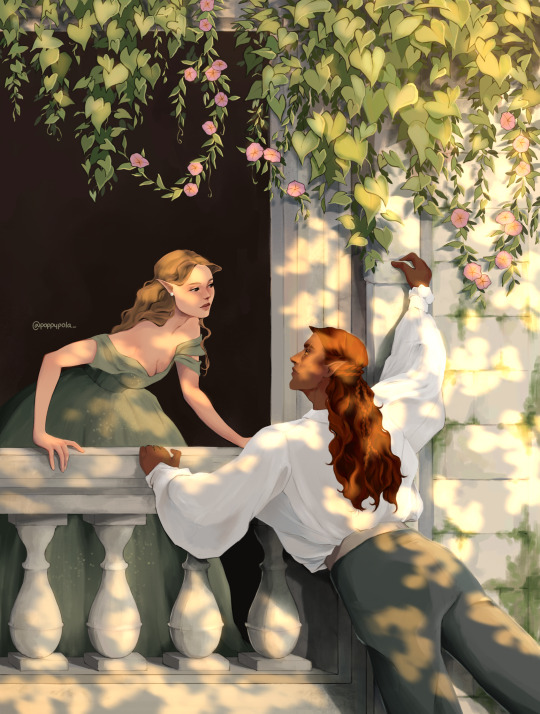

A prince climbing up the balcony for a chance to earn a gentle kiss from his princess.
This is my first ever commission and I cannot thank poppypola_ enough for this stunning work. The vision was the balcony scene near the end of the film ‘Letters to Juliet,’ where Charlie climbed the balcony in an act to reach Sophie after a slight misunderstanding. Elain and Lucien are incredibly regency coded and their romance is no different—fleeting looks, careful touches, and quiet kisses in her garden with roguish humor and playful blushes.
Art credit poppypola_ on Instagram
Commissioned by — Me
Reposts allowed with full credit
#balcony scene#deny thy father and refuse thy name#thou art thyself though not a Vanserra#elucienweek2024#day 4: high society#elucien fanart#elucien#pro elucien#elain and lucien
602 notes
·
View notes
Text
youtube
Yeah! I’ve always known this! That is why I am Luciferian! Hail Lucifer! Through Lucifer’s guidance we are lead to truth, we are lead to apotheosis, we are lead to life’s purpose.
#hail lucifer#Pandeism#thou art god#you are god#yaweh is not god#Lucifer is God#Lucifer guides you to apotheosis#I love Lucifer#know thyself#Satan is king#🤴#sister Satan#Youtube
1 note
·
View note
Text
} (newby) demon muzan, soft muzan?, arranged marriage, fiancée! reader, fem! reader, mention of bl00d, reader's face got cut
let's pretend that blo0d transfusion exists in haien period a/n; usually, I stick to writing headcanons and avoid posting scenarios because I worry it might not be good enough. however, I've chosen to take a chance this time so if there are any mistakes, please bear with me y-y wc : 1.2k
you never imagined that one day you would willingly sacrifice yourself to aid your sick fiancé, who barely acknowledged you
he was unkind. neither of you had agreed to this arranged marriage; it was solely the decision of his family, the Ubuyashiki clan, who couldn't bear the thought of their ailing son dying alone

at first, the situation was difficult, Muzan be believed having a wife wouldn't extend his life or be of any use. you tried your best, simply aiming to fulfill the marriage contract, we don't have to be in love
the arrangement benefited both clans. the Ubuyashiki clan could lessen their appearance of pity by providing a wife for their son, while your family could regain their lost wealth and noble status during their down in luck
and at the turning point, when he was injured and lost a lot amount of blood. neither his family nor yours offered to help him, they were afraid to give blood to someone like him. they're just hired a cheap doctor to care for him, you were the only one willing to give him your blood without hesitation
after that, he was more open to you
until the day the doctor's medicine was effective
but without knowing it, you were only happy for your fiancé to become healthy like normal people. you heard a nonsensical rumor about a demon attacking people at night, it must be a bear or wild animals..
" I am greatly rejoiced for thee, that thy health hath now become better " you said it as you started to sit beside him on the warmed tatami mat, gazing out at the garden beyond
" the physic hath wrought an unexpected efficacy upon me " he nodded in agreement, raising his arm and gently squeezing it to show the increased muscle and strength he now possessed
" I heard he was a thrifty physician, deemed unfit, yet he proved skilled to mend thee, I do delight exceedingly " as you mentioned this, making Muzan to reconsider his first encounter with the doctor. he couldn't believe he would successfully be healed, as the doctor was merely a cheap physician hired by his clan
" in speaking thereof, thou dost prove thyself useful to me " he turned his face towards you and smiled gently, a smile that could barely be called a smile
" I do greatly admire thy bravery " he said, his smile filled with pride and happiness, yet tinged with a sadistic undertone that sent shivers down your spine
his words left you stunned; you never expected a compliment from someone like him " my pleasure " you said as you bowed to him, It really makes you feel happy, yet it seems like god isn't kind to either of you
" yet unfortunately, I hope that one day thou and I may stroll together, now it is unwise to go abroad by night " you express how shameful it was for the chance of having a normal life with him to be interrupted by some kind of creature " folk do speak of a demon, that doth hunt people by night " you know he doesn't believe in anything silly like this, so the reaction he gave you afterward was not surprising
" demon.. tis the name by which they are called? " he chuckles softly, of course he would do that, you think, he's the man who- " art thou fearful of demons" his question caught you off guard. he doesn't mean it, does he?
sometimes he asks you strange questions, given that he has spent his entire life trapped in his own house. questions about the outside world grab his attention the most, so you didn't mind it, but that doesn't mean he would believe in such a fairy tale like this. you remain silent, not because you're trying to avoid his question, but as his voice shifts, growing more serious " in the night doth stalk a creature, feeding on flesh of men.. art thou afraid? " he looks at you, and you sense he already has an answer in mind. if you answer wrongly, you fear something bad might happen
" I do not believe in demons, tis but a wild beast " you answered while trying to hide the fear you felt, his question has indeed made the atmosphere awkward, you think
Muzan tilts his head slightly " is it so? what if... what if I be that demon? wouldst thou be afraid? " he seems to enjoy seeing you like that
" what do you mean? "
" thou hast heard my words. wouldst thou abandon me if I were that demon? even there is no chance of fleeing from me "
what on earth is he talking about? " I... " your words evoke a sense of fear and confusion, as he reaches his hand to gently touch your cheeks, his actions were so contrasting to what you felt; he touched you as if it were something fragile, yet not with the intention to protect, but to possess it, to do whatever he pleased with it
" what a pity. I do hold thee dear, and thou wilt surely prove useful unto me " you startled slightly; his hand felt so cold, almost as if he weren't human
" hast thou any final words? " you trembled, hearts beating fast, unsure if it was pure fear or excitement. you didn't feel the urge to run away; it was the same mix of emotions you felt when you first volunteered to give him your blood, the joy of helping someone you love, intertwined with the fear that death might be near, and you might not make it out alive " thou didst inquire if I fear demons? do I dread death? I would say, tis not that I lack fear, but the very thought of aiding thee doth making me to endure it " you're contemplating your feelings, realizing there's no right answer for him. in that moment, you didn't strategize on how to answer so he would spare your life, instead, you acted on what your heart felt, just being honest, something you wouldn't regret later— though there might be no 'later,' because you're going to die right here at his hands " I once gave thee my blood, I do not fear to give thee my blood again, it gladdens my heart that I may lend thee aid once more " you close your eyes, gently touching his hand on your cheek, cherishing this fleeting moment of happiness for the last time " take it all as thou dost desire " you said, as you turned to place a soft kiss on his palm, that even if he's not used to or doesn't like being touched, what's the worst that could happen? he's gonna kill me? then- well..
Muzan paused, stunned by your response. then, a sadistic smile slowly spread across his face once more, his eyes gleaming with a disturbing intensity. as he began to grow out his sharp, menacing nails, pressed them firmly against your cheek, and sliced your cheeks until they were red and bleeding " it would be discourteous of me to not return what I have received, I shall give thee my blood also " it was a gift from the demon king, leaving you unsure whether it should be seen as a blessing or a curse. nevertheless, if this is what god desires, then so be it
#demon slayer#kny#kimetsu no yaiba#kimetsu academy#demon slayer muzan#muzan#kimetsu no yaiba muzan#yandere muzan#muzan headcanons#muzan imagine#kibutsuji muzan#kny muzan#muzan kibutsuji#muzan x reader#kny imagines#kny x reader#demon slayer headcanons#demon slayer imagine#kny scenarios#muzan x y/n
414 notes
·
View notes
Text
THOU, THEE, THY, THINE. SAME THING RIGHT?
NO.
Although they seem very similar, Shakespeare would be in tears if he saw how most people mix them up. lets save William the misery and teach you when to correctly use thou, thy, and thine.
THOU
Thou = You (in subject form)
"Thou art killing me." "Art Thou crying?"
THEE
Thee = You (in object form)
"I want to kill thee." "My dog ate thee in my dream."
THY
Thy = Your (before a word that starts with a consonant)
"Thy mother." "Give me thy duck."
Thyself is used the same as any other thy+word combination like "thy mother" but without a space
"Take care of thyself."
THINE
Thine = Your (before a word that starts with a vowel)
"Thou art on thine own." "Thine answer hath satisfied mine query."
OR
Thine = Yours
“This is thine.” “The throne is thine, should thou choose to take it.”
(last 2 examples by @bookishwenchmeltha)
Now Shakespeare can truly rest in peace.

Go follow me @leisureflame for more posts like this!
#writing#shakespeare#language#old english#history#writing tips#writing recources#early modern english#thy#thine#thou#thee
927 notes
·
View notes
Text
interviewer: team green or team black?
fabien: o gwayne, gwayne, wherefore art thou gwayne? deny thy sister and refuse thy name. or if thou wilt not, be but sworn my love and i’ll no longer be a cole. tis but thy name that is my enemy: thou art thyself, though not a hightower. what’s hightower? it is nor hand nor foot, nor arm nor face nor any other part belonging to a man. o be some other name. what’s in a name? that which we call a rose by any other name would smell as sweet; gwayne would, were he not gwayne call’d, retain that dear perfection which he owes without that title. gwayne, doff thy name, and for that name, which is no part of thee, take all myself.
interviewer: okay
#I’m sorry#criston cole#fabien frankel#gwayne hightower#criston x gwayne#crisgwayne#gwaynston#hotd#still don’t know what ppl are calling it if we even are#making this a thing even if he dies next ep idec
190 notes
·
View notes
Text
gale & withers: epilogue
i stumbled across this while taking another look at the epilogue files:

it's withers talking to an origin gale, who made the ultimate sacrifice in the final battle against the netherbrain to save not only faerun, but his friends:
Withers: Who flickers there 'twixt the shadows? Gale, who didst surrender his very self for the salvation of Faerûn. Withers: I feared I might not find thee here - that Mystra would have already plucked thy thread from the tapestry of fate. But she may wait a while yet. Withers: Tell me, Gale, how doth thee weigh thy sacrifice, now it hath been made?
origin gale can pick from a variety of responses:
option 1:

Gale: I've no regrets. I'd do it again if I had to. Withers: The Weave floweth not in this place of shadows, Gale of Waterdeep, but thine heart singeth in its place.
the weave floweth not in this place of shadows, gale of waterdeep, but thine heart singeth in its place.
gale has a genuinely good heart. it reminds me of this piece of lore again:

as well as tara saying this:

Tara the Tressym: If that's all, then what comes after is for you to decide, Mr Dekarios. Think well on all that's happened, and stay true to that heart of yours. It's a good one.
option 2:

Gale: I feel... unburdened. I've redeemed myself at last. Withers: Redemption need not require such sacrifice, but there can be no doubt thy penitence is complete. Thou art absolved at last.
'redemption need not require such sacrifice' is such a good quote here and i like it a lot. tragic that larian's own lead writers didn't get that memo.
option 3:
Gale: I didn't want to die, but I couldn't see any other way... Withers: Circumstance did not ordain thy fate, but thine own strength. Thou wert ready for such a sacrifice, and thou art ready still.
hm. not loving this one. i suppose it's the game reinforcing the player's choice.
option 4

Gale: One wizard for the whole of Faerûn seems like a fair trade to me. Withers: It is time thou learnest to value thyself truly. Thy sacrifice weighs greatly on those thou left behind, as it doth in this place.
IT IS TIME THOU LEARNEST TO VALUE THYSELF TRULY

#gale dekarios#gale of waterdeep#withers#jergal#baldur's gate 3#bg3#baldurs gate 3#ch: gale dekarios#ch: jergal#vg: baldur's gate 3#series: baldur's gate#meta: mybg3#cw sui mention#cw death
376 notes
·
View notes
Text


RA ∆.∆∆ Talon Abraxas
A HYMN TO RA, WHEN HE RISES IN THE EAST.
Hail, thou Aten, thou lord of rays, who risest on the horizon day by day! Shine thou with thy beams of light upon the face of the Osiris Ani, the truth-speaker, who sings hymns to thee at dawn, and adores thee at eventide. Let his soul appear with thee in heaven. Let him sail out in the Matet Boat and arrive in port in the Seqtet Boat, and let him cleave his way among the stars that never vanish.
Homage to thee, O Her-aakhuti, who art Khepera, the self-created!
When thou risest and sendest forth thy beams upon the lands of the South and the North, thou art beautiful, yea beautiful, and all the gods rejoice when they see thee, the King of Heaven.
Nebt-Unnut (a goddess) is on thy head, her serpents are on thy head, and she takes her place before thee. Thoth stands in the bows of thy boat to destroy thy foes.
The denizens of the Tuat (Underworld) come to meet thee, they bow before thee in homage at the sight of thy Beautiful Form.
I would come before thee daily to be with thee and to behold thy Beautiful Aten (Disk). Let me be neither prevented nor repulsed.
Grant that when I look upon thy beauties my members may be made young again, even as are the members of thy favoured ones.
I am one who worshipped thee on earth. Let me enter the Eternal Land in the Everlasting Country. O my Lord, I beseech thee to decree this for me.
Homage to thee who risest as Ra on thy horizon and restest upon Maat!
Thou passest over the sky, every face watches thy course, thou thyself being unseen. Thou showest thyself at dawn and at eve daily.
The Seqtet Boat of thy Majesty goes forth mightily, thy beams fall upon every face, thy variegated lights and colours cannot be numbered, and cannot be told . . . .
One by thyself alone didst thou come into being from the primeval waters of Nunu (or Nu).
May I go forward as thou dost advance without pause, and dost in a moment pass over untold leagues and as thou sinkest to rest even so may I.
Thou art crowned with the majesty of thy beauties, thou dost fashion thy members as thou dost advance, and dost produce them without the pangs of labour in the form of Ra, and dost rise up into the heights.
Grant that I may come into the everlasting heaven and the mountain where thy favoured ones dwell. Let me join myself to those who are holy and perfect in the divine Underworld, and let me appear with them to behold thy beauties at eventide. I lift my hands to thee in adoration when thou the living One dost set. Thou art the Eternal Creator and art adored at thy setting in heaven.
I have given my heart to thee without wavering, O thou who art the mightiest of the gods . . .
75 notes
·
View notes
Text
Enter CRAIG
CRAIG: Ho, Tweek! Come hither. Hark, our courtship wilt end.
TWEEK: What? wherefore not?
Enter STAN, KYLE, KENNY, DAVID, and BUTTERS
CRAIG: I prithee, Tweek, I am full of sorrow, yet we can no longer deceive ourselves. [turns to visage the gathering crowd] Aye, we are of the same inclination, but we are not meant to be as one.
TWEEK: Thee disavow our bond? What suddenly hath changed, craig?
CRAIG: ‘Tis just yond people art inevitably different. Nothing more.
TWEEK: Aye, and who in heaven's name is Michael? Pray, dost thou wish to enlighten me on this matter?
CRAIG: What? what doth thee speaketh of?
TWEEK: I did peruse thy missives when we ventured forth yesternight, Craig! I beheld what thou didst utter to this strumpet regarding thy intent to consort with him!
CRAIG: Stay, prithee, that is not what transpired.
TWEEK: I pray thee confess otherwise
CRAIG: Nay. Mark thee, we both dost know this is for the better.
TWEEK: Thou dost presume to subject me to thy feeble terrors! Thou dost impose thy will upon me to dissuade thine own guilt!
CRAIG: Stay, do not portray me as the knave.
TWEEK: [Begins to cry] Fie, thou art not the villain. Thou think'st thyself too virtuous to be some loathsome knave. For, 'tis from thy heavenly throne that thou canst better behold the folk thou usest as puppets.
CRAIG: [whispers] I do fear thou hast ventured far enough. Cease, for this pretense is superfluous.
TWEEK: Zounds! Dost thou think I have gone too far? Hast thou lost thy wits?
CRAIG: This condemnation was not a part of our design!
TWEEK: Marry Prithee, Craig! Our love was not wrought to adhere to a design!
BUTTERS: Aye!
TWEEK: [tears fill his eyes] I have been most grievously deceived by thee. I lay bare mine heart before thee. I lay bare mine affection unto thee. I embrace thee as mine lord. But, alas, I fall upon the sword. Thy sword.
Exuent Tweek
101 notes
·
View notes
Text
Reading the Ancient Magic Book Pages
I propose to you today a short analysis of the sections of text on the pages of the Ancient Magic book we find below the restricted section.
High-res images of the book’s pages have been shared by a kind soul. Here they all are:
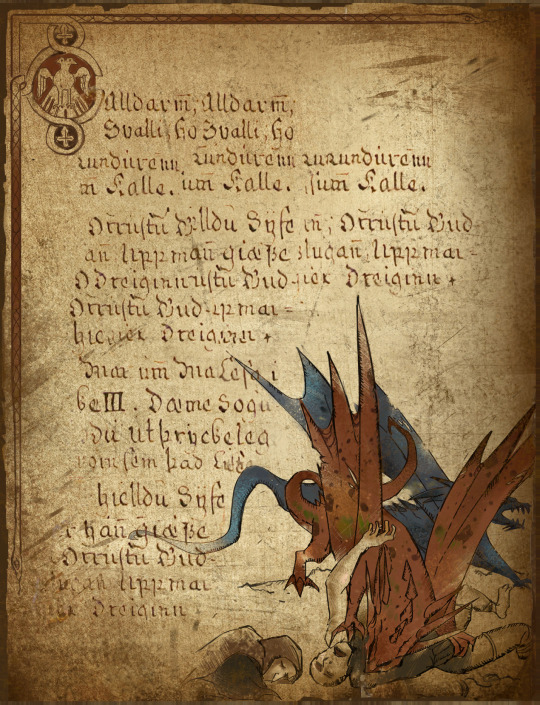
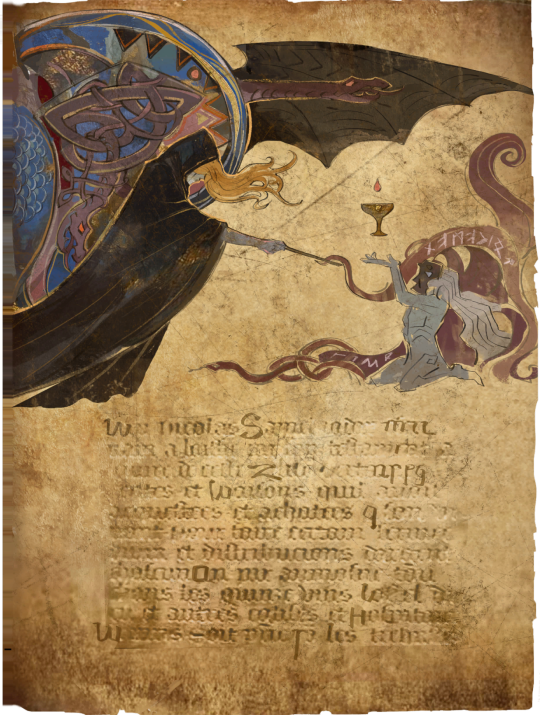
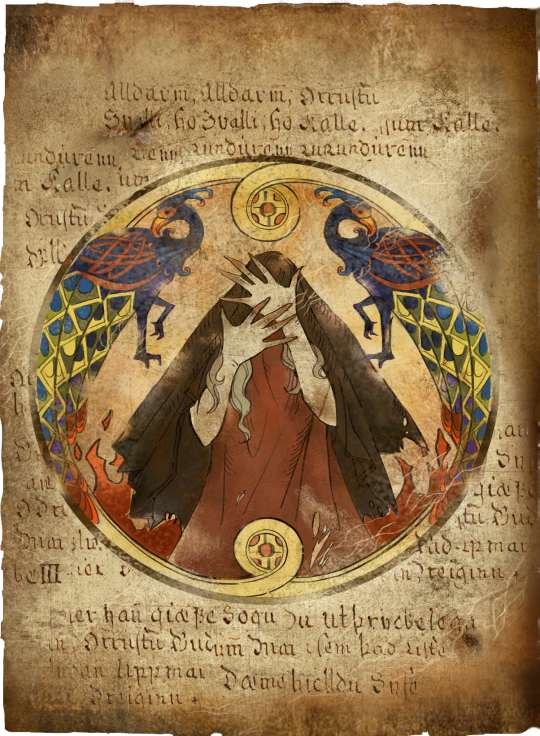

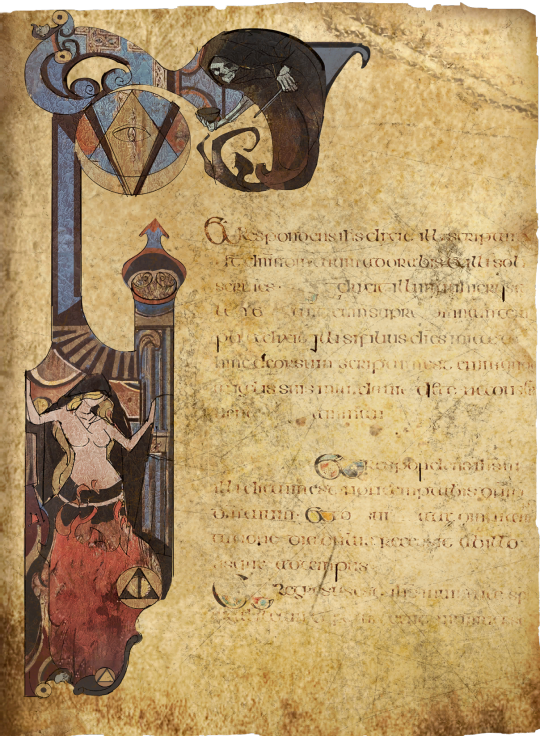
I was working on a completely different post when I realised that the text on the last 2 pages was easily readable and written in Latin. So I just did a quick search and discovered that these are verses from the Vulgate (4th century translation of the Bible in Latin), more precisely from the Gospel of Luke from the New Testament.
A bit more research and I could find exactly which source they got this text from: the Book of Kells, a Celtic Gospel book written in Latin and illuminated in the Insular style (a combination of Celtic and Anglo-Saxon styles). The precise origins of the Book of Kells are debated but many believe it was created around the year 800 at the monastery founded by St Colum Cille on Iona Island in western Scotland.
Here I put side by side the pages of the Ancient Magic book and the pages from the Books of Kells where the text is from (folio 204r and 275r):

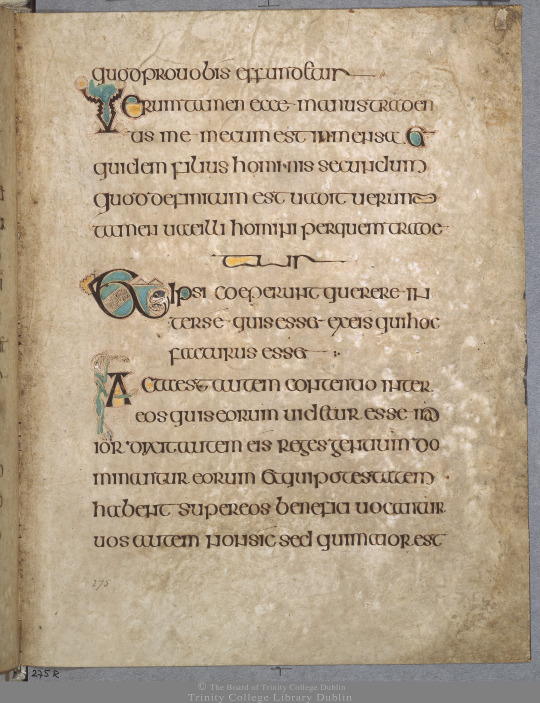

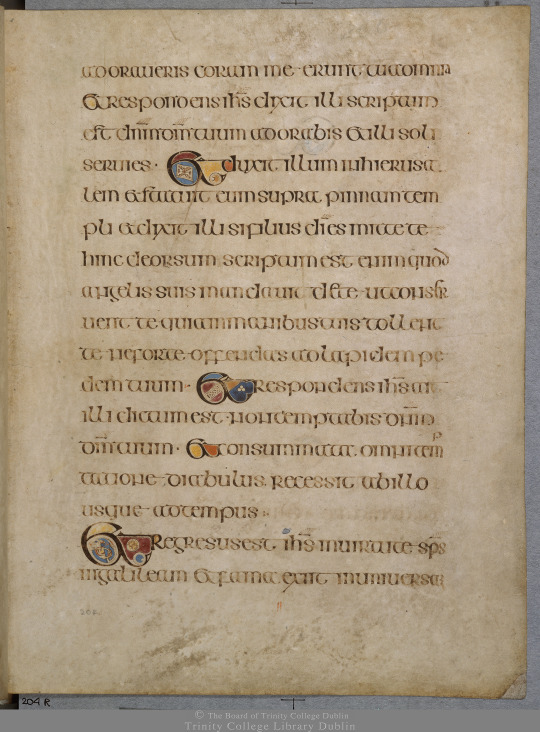
The verses they used are Luke 22:23
Et ipsi coeperunt quaerere inter se quis esset ex eis qui hoc facturus esset.
Which translates to:
And they began to enquire among themselves, which of them it was that should do this thing.
And on the second page, Luke 4:8-14
Et respondens Jesus, dixit illi: Scriptum est: Dominum Deum tuum adorabis, et illi soli servies. Et duxit illum in Jerusalem, et statuit eum super pinnam templi, et dixit illi: Si Filius Dei es, mitte te hinc deorsum. Scriptum est enim quod angelis suis mandavit de te, ut conservent te: et quia in manibus tollent te, ne forte offendas ad lapidem pedem tuum. Et respondens Jesus, ait illi: Dictum est: Non tentabis Dominum Deum tuum. Et consummata omni tentatione, diabolus recessit ab illo, usque ad tempus. Et regressus est Jesus in virtute Spiritus in Galilaeam, et fama exiit per universam regionem de illo.
Which translates to:
And Jesus answered and said unto him, Get thee behind me, Satan: for it is written, Thou shalt worship the Lord thy God, and him only shalt thou serve. And he brought him to Jerusalem, and set him on a pinnacle of the temple, and said unto him, If thou be the Son of God, cast thyself down from hence: For it is written, He shall give his angels charge over thee, to keep thee: And in their hands they shall bear thee up, lest at any time thou dash thy foot against a stone. And Jesus answering said unto him, It is said, Thou shalt not tempt the Lord thy God. And when the devil had ended all the temptation, he departed from him for a season. And Jesus returned in the power of the Spirit into Galilee: and there went out a fame of him through all the region round about.
I’m not christian and don’t know much about the Bible so I have no idea why they chose these particular verses. Maybe someone more educated than me will be able to chime in. My hunch is that these verses were just chosen at random from old manuscripts that the artists for the game were using as reference for the art style.
Now, since I was on a roll, I also looked at the text on the other pages. Pages 1 and 3 have some text written in some old form of Icelandic (figured that out from the few words I could sort of read on those pages). So I started looking into old Icelandic manuscripts but it took me a ridiculously long time to find the exact source the text is from! I was starting to go mad but here it is! It’s from an illustration of the Prose Edda found in the Icelandic manuscript ÍB 299 4to., in particular the illustration of the god Týr presented as Mars (folio 60r).
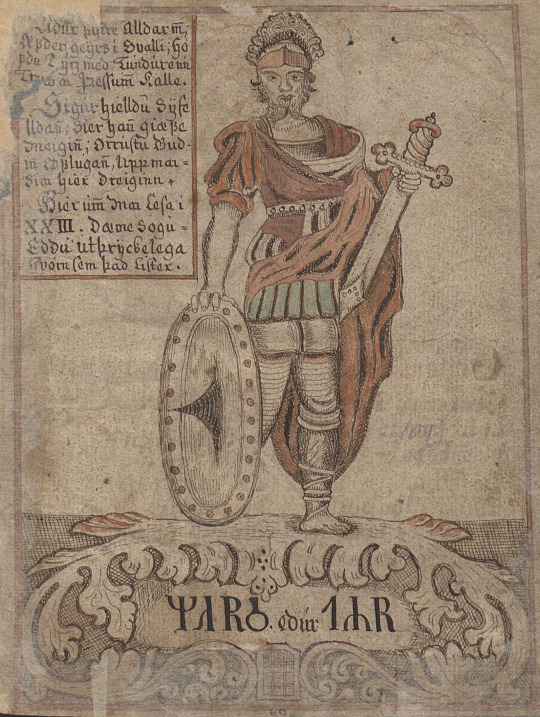


They took the short text in the little box and copy/pasted it mosaic style to give the illusion of the full page of text but you can see it’s just short sections that repeat over and over on both pages.
(To note: this manuscript is from 1764 so it’s sort of anachronistic for them to use this source for an Ancient Magic book that already existed in the Keepers time, meaning the Ancient Magic book is from the 15th century or older.)
Týr is one of the principal war gods in Norse mythology (alongside Odin and Thor) but he also presides over justice and the law. Latin texts often identified him as Mars (hence the subject of the illustration).
I could not find any transcription or translation of the text on the image, I could only decipher some words here and there such as «sigir hielldu» which google translate tells me could mean «victories held» in Icelandic. A bit further down there is «orrustu guð» which could mean «god of war». So it seems to be a short description of the god Týr and at the end there are roman numerals that identify the section in the Prose Edda where the story of Týr can be found.
Again, I can’t really see how this text makes particular sense in the context of the Ancient Magic book, probably just placeholder text from some of the sources they were studying as inspiration.
There is one last book page, but the text on this one is so blurred I didn’t even try to decipher it. Although I do note that the artist has traced over some letters which are: W S M I(?) I(?) I(?) Z N R(?) P(?) G W Q O U(?) H W R(?)

Don’t know… some of them are hard to read or could be not from the Latin alphabet. Again, I just can’t make sense of that. There are not enough vowels for it to be an anagram of an English or Latin phrase so… what else? I leave this mystery to others with more powerful brains than mine!
Anyway, this is it! Not really much to say about this but I think other people are also planning on looking into these book pages so maybe these findings can help them out!
92 notes
·
View notes
Text

KNOW THYSELF
“I warn you, whoever you are….. Oh, you who wish to probe the arcanes of nature, If you do not find within yourself that which you seek, Neither shall you be able to find it outside.
If you ignore the excellences of your own house, How do you intend to find other excellencies? In you is hidden the treasure of treasures.
Oh, man, know thyself and thou shall know the Universe and the Gods!” – Phrase inscribed in the ancient Temple of Delphi
“To know thyself is the beginning of wisdom” – Socrates
Know thyself, and thou shalt know the universe and God.
Art by Jon Jude Palecar
44 notes
·
View notes
Text
Turning 'Abomination Dark Urge condensed into a fleshy mortal casing' in my head again:
You'd probably end up with a 5e elven-style 'you have the memories of millennia of lifetimes, but that wouldn't fit in your fleshy mortal-shaped brain, so your soul just puts it into storage so you only get vague impressions like déjà vu and instincts and sometimes bits of memory show up in reverie/trance. You would remember all of it if you shed your mortal form (when the soul is in Arvandor after death between lifetimes).'
And then of course Durge goes and gets brain damage and now knows nothing about their creation or what they are on top of that, and as a rule the gods like Abominations contained and are content to let this one stay in its amnesiac prison of seemingly normal mortal life and personhood.
Withers: 'Thou art now fully mortal. Entirely normal. Trust me. Also thou shall not die and escape thy mortal form while I have any say in it. For reasons.'
Durge: 'That all seems unlikely, but ok. Will I ever get my memories back though?'
Withers: 'Wouldst thou enjoy the full weight of the crushing horror of the evils of the universe and all that thou wert destroying the identity thou hast created for thyself, washing away thy friends and loves with it?'
Durge: '...no?'
Withers: 'Then Do Not Try.'
Withers: 'Unless I decide I have need of an apocalyptic event.'
Durge: 'What?'
Withers: 'What?'
#Durge as a sealed can of evil is fun.#The fun thing about Durge is that the vagueness allows you to invent so many flavours of backstory.#The annoying thing is that I still haven't settled on one#babbling#/durge#edgelord hours#headcanoning.
58 notes
·
View notes